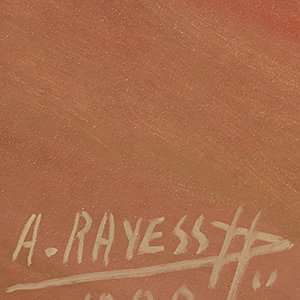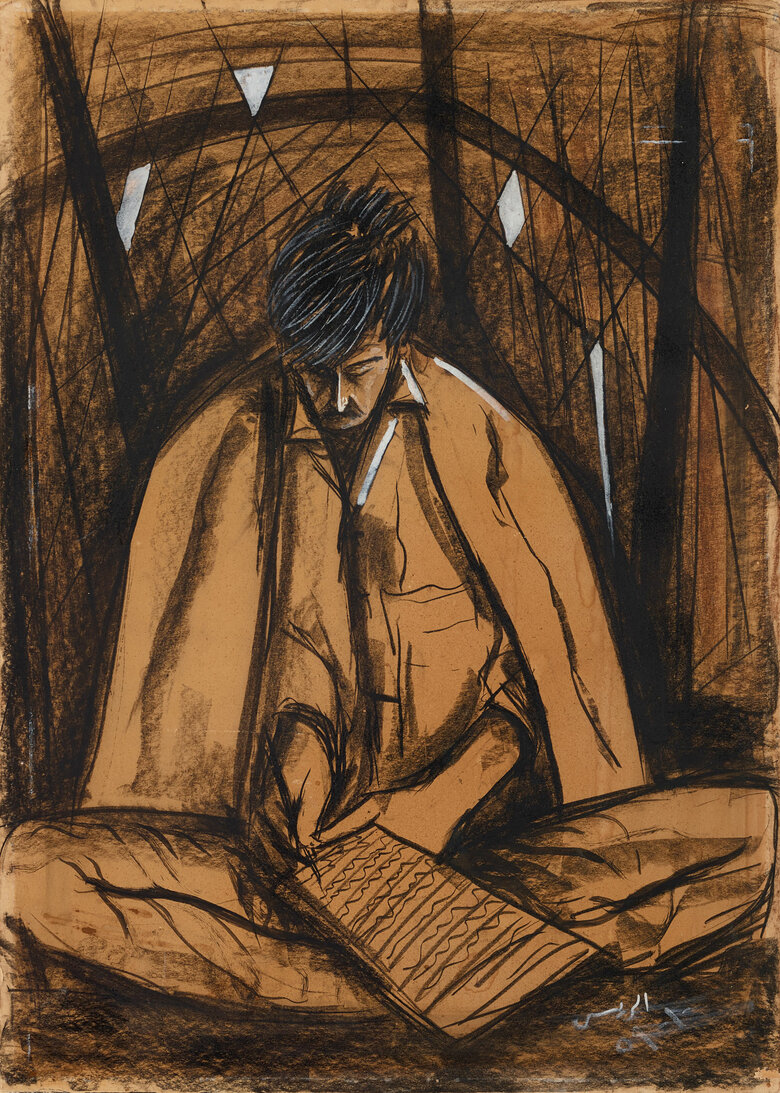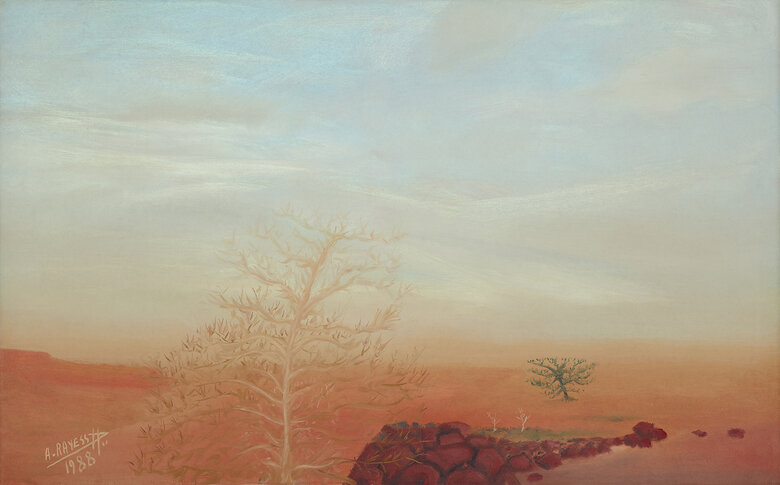Aref Rayess was a Lebanese painter, sculptor, and thinker who played a significant role in the history of Lebanese modern art. Born in Aley, Mount Lebanon, in 1928, he started drawing and...


AREF RAYESS, Lebanon (1928 - 2005)
Bio
Written by WAFA ROZ
Aref Rayess was a Lebanese painter, sculptor, and thinker who played a significant role in the history of Lebanese modern art. Born in Aley, Mount Lebanon, in 1928, he started drawing and painting at the tender age of eleven. The nomadic artist, who toured Africa, Europe, North America, and the Gulf, learned from his travels in developing his unique style but never had a formal art education. Although he was self-taught, he collaborated with Nicolas Nammar to found the Institute of Fine Arts at the Lebanese University in 1963, and taught there from 1966 until 1980. In 1969, he was elected chairman of the Lebanese Association of Artists and Sculptors, a position he held until 1977. Rayess was not only a multidisciplinary painter, sculptor, and illustrator, and he was also an astute thinker and keen observer. Influenced by the Druze doctrine and its esoteric notions of mysticism, he believed in the interconnectivity of the universe, man, and time. His works revolved around humanity, identity, and nature, denouncing injustice, materialism, and the superficiality of nationalism in the Global South.
Rayess’s artistic talents manifested at an early age, as did his lifelong interest in the political subject matter.
When he was only seventeen, Rayess completed a charcoal drawing depicting Hiroshima’s atomic bomb tragedy that caught the eye of Arlette Levi, a reporter for L’Orient,who happened to be visiting Rayess’s mother in Aley. Fascinated by his drawing, Levi returned the next day with the artist Georges Cyr, who was impressed and insisted that Rayess must show his work.
In Autumn of 1948, Rayess held his first exhibition in the West Hall of the American University of Beirut. He later traveled to Senegal, working merely to survive, painting scenes from his new surroundings with relish. He moved to Paris in the spring of 1948, where he trained in a variety of media with several prominent artists, including Fernand Léger and André Lhoté. While studying at the Académie de la Grande Chaumière in Montmartre, Rayess learned Etching with Johnny Friedlaender and sculpture with Ossip Zadkine and learned the art of corporeal mime under the tutelage of Etienne Decroux and Marcel Marceau. Rayess was first exposed to the pantomime in Senegal and found that grasping the art of corporeal movement nurtured his expressive abilities and enhanced the aesthetic level of his works. Between 1954 and 1956, Rayess spent his time touring West Africa, exploring the religious and cultural milieu of various ethnic groups there. His work during this time depicted the built environment, landscape, and theatrical practices he encountered in his travels, and took on an expressionistic style inspired by the bold colors, patterns, and motifs of West African visual traditions.
Rayess returned to Lebanon in 1957,where he studied the elements of Phoenician, Assyrian, Sumerian, and Pharaonic art before moving to Florence on a scholarship from the Italian government. There, he studied sculpture under the mentorship of Antonio Berti, then moved to Rome, where he trained with Lionello Vantouri and Alberto Giacometti between 1960 and 1963. Influenced by Arte Povera, he produced works mixing oil paint with sand, comprising geometrical shapes, quirky lines, and circles resembling ancient mythical lands. The skills and interests he developed in Lebanon and Italy are apparent in two important commissions from the Lebanese government during this period. The first, a tapestry entitled The Signs of Cadmus (1958), was commissioned for presentation at the UNESCO Palace in Paris, and vibrantly depicts a hippocampus surrounded by letters from the Phoenician alphabet. For the second, Rayess produced two large Phoenician-style sculptures to represent Lebanon at the 1964 World’s Fair in New York.
The artist returned to Lebanon in 1963 and established himself amongst the capital’s artists and cultural workers. During this time, he worked with Janine Rubeiz to found Dar El Fan, a cultural space that was destined to play a major role in the artistic life of Beirut. Though he had hoped to settle down in Beirut, his commission for the 1964 World’s Fair ultimately won him a scholarship to the United States, where he spent two years traveling between several different states.
The political valances that had appeared in Rayess’s work from the time of his Hiroshima drawing developed sharper edges following the Arab defeat of 1967. During the 1970s, his paintings often focused on the decadence of nations, the tyranny of leaders, and tragedies of war, as is evident in a series of dramatic and cynical paintings entitled Blood and Freedom (1971). In 1976, while in Algeria, he produced a remarkable collection of 37 etchings from charcoal drawings entitled The Road to Peace. These juxtaposed the dreadful events of the Lebanese Civil War with jarring figures and morbid backgrounds associated with the Algerian revolution. Rayess reflected on controversial social matters too, such as in a series of works entitled The Flowers of Rue Al Moutanabbi (1971-1973), in which he depicted scenes from a brothel in old downtown Beirut in colorful representational paintings. He never associated his work with a specific movement and considered his repertoire to be a vocabulary of images meaningful to himself. His work juggles diverse styles, deploying figuration, expressionism, symbolism, and geometrical abstraction across a variety of different media. His canvases voiced an endless dialogue between shape, form, color, and texture, often yielding to elaborately patterned surfaces in sober colors.
In the 1980s, Rayess traveled to Saudi Arabia, where he was appointed as the Art Consultant for the city of Jeddah. Commissioned by Mohammad Said Farsi, the mayor of Jeddah, he produced several monumental public sculptures in marble and metal. The most significant of these is a twenty-seven-meter-high aluminum sculpture, a geometrical abstraction of the name Allah, which stands in Palestine Square. Captivated by the serenity of the desert and the extended seashores of Jeddah, he painted landscapes in artificial hues with rocks lying before surreal hazy backgrounds, maintaining a high level of plasticity in his works and depicting the desert light with a sense of purity and mysticism.
Rayess spent his later years working in his homeland. Starting in 1999, he organized the annual Symposia of Painting and Sculpture, which invited Lebanese sculptorsto use a piece of land belonging to the municipality of Aley as an open-air studio. After the artist passed away in 2005, Wajdi Murad, Mayor of Aley, announced the opening of an outdoor museum, a garden, and an artspace in homage to the late Aref Rayess.
Sources
Abillama, Nour Salamé, Marie Tomb, Gregory Buchakjian, Sylvia Agémian, Tamara Zantout, and Pia Bou Khater. Art from Lebanon: modern and contemporary artists 1880-1975. Beirut, Lebanon: Wonderfuleditions, 2012.
Nammour, Cesar, and Gabriela Schaub. Resonances, 82 Lebanese artists reviewed by Helen Khal. Beirut: Fine Arts Publishing, 2011.
THE UNESCO WORKS OF ART COLLECTION. Accessed January 10, 2018. http://www.unesco.org/artcolle...
Mokbel Art Collection - Collection. Accessed January 10, 2018. http://www.mokbelartcollection...
"Aref El-Rayess." The Park Gallery. May 12, 2016. Accessed January 10, 2018. http://theparkgallery.com/arti...
"Aref El-Rayess (Lebanese, 1928-2005) , Untitled." , Untitled | Christie's. Accessed January 10, 2018. http://www.christies.com/lotfi...
"Aref El-Rayess (Lebanese, 1928-2005) , Untitled." , Untitled | Christie's. Accessed January 10, 2018. http://www.christies.com/lotfi...
"Artistic research Practices." Catherine David - AREF RAYESS, ET LES ANNÉES 60 ET 70 À BEYROUTH - Archives - Artistic research Practices - Lebanese Academy of Fine Arts (ALBA) - Balamand University. Accessed January 10, 2018. http://www.alba.edu.lb/english...
"CommemoratingAref El Rayess (1928-2005)." Cloud of Lace. August 14, 2015. Accessed January 10, 2018. http://cloudoflace.com/commemorating-aref-el-rayess/.
Matar, William. One Fine Art | Artists - Sculptors / Aref El Rayess. Accessed January 10, 2018. https://www.onefineart.com/artists/sculptors/Aref-El-Rayess.
Nammour, Cesar, and Gabriela Schaub. Resonances, 82 Lebanese artists reviewed by Helen Khal. Beirut: Fine Arts Publishing, 2011.
Haddad, Reem. "Sculpting symposium nurtures Aley's dream to be 'bride of villages' again." The Daily Star Newspaper - Lebanon. Accessed January 12, 2018. http://www.dailystar.com.lb/Culture/Art/2000/Aug-29/104838-sculpting-symposium-nurtures-aleys-dream-to-be-bride-of-villages-again.ashx.
حديقة الفنان عارف الريس في عاليهAref Al Rayess
AghaniAghani. YouTube. November 28, 2013. Accessed January 12, 2018.https://www.youtube.com/watch?v=I56KmGGrfkM.
رحلة داخل الذات، عارف الريس في حوارات مع الصحافة. بيروت، لبنان: دار الجديد, ١٩٩٩
A Selection of Interviews, Rehlah Dakhel al-Zat” (A journey within myself). Beirut, Lebanon: Dar AlJadeed Publishing, 1999.
Al Qobayssi, Omran. Aref Al Rayess. Beirut, Lebanon: Al Mohtaraf.
CV
Selected Solo Exhibitions
2023
AREF EL RAYESS: Paintings from 1999, Sfeir-Semler Art Gallery, Beirut, Lebanon
Aref El Rayess: Labyrinths, Sfeir-Semler Gallery, Beirut, Lebanon
Aref El Rayess: Works (1958-1978), IVAM Centre Julio González, Valencia, Spain
2002
Noir et Blanc - Temps et Homme d'Aref Rayess, Espace SD, Beirut, 2002
2001
Chants du carré, Galerie Janine Rubeiz, Beirut, Lebanon
1997
Gallery World Of Art, Beirut, Lebanon
1996
Galerie Janine Rubeiz, Beirut, Lebanon
1995
Centre Culturel Français, Beirut, Lebanon
1993
Hommage au petit prince, French Cultural Center, Beirut
1979
Galerie Epreuve d’Artiste, Beirut, Lebanon
1978
Exposition Caracas, Venezuela
1976
Galerie Racim, Algeria
1975
Gallery Le Point, Beirut, Lebanon
1974
Ornina Gallery, Damascus
1973
The Flowers of Rue Al Moutanabbi, Galerie Contact, Beirut, Lebanon
1972
Gallery One, Beirut,Lebanon
1971
Galerie Manoug, Beirut, Lebanon
1970
Dar El Fan, Beirut, Lebanon
1969
Dar El Fan, Beirut, Lebanon
National Museum of Damascus
1968
L’Orient-le Jour, Beirut, Lebanon
1967
Gallery One, Beirut, Lebanon
1966
Rodin Museum, Paris,France
1964
Galerie Excelsior, Mexico
D’Arcy Galleries, New York, USA
Galerie La Licorne, Beirut, Lebanon
1963
Galerie La Licorne, Beirut, Lebanon
1961
Galerie La Licorne, Beirut, Lebanon
1959
Poliani Gallery, Rome, Italy
Numero Gallery, Florance, Italy
1958
Galerie Alecco Saab, Beirut, Lebanon
1957
Italian Cultural Center, Beirut, Lebanon
1954
Dakar, Senegal, Africa
1948
American University of Beirut, West Hall, Lebanon
Selected Group Exhibitions
2025
Aref El Rayess and then...عارف الريّس ومِن ثَم..., Gallery 405 AUB, Beirut, Lebanon
2024
Lebanese Landscapes, Agial Art Gallery, Beirut, Lebanon
Arab Presences: Modern Art And Decolonisation: Paris 1908-1988, Musée d'Art Moderne de Paris, Paris, France
At the Edge of Land, Jameel Arts Centre, Dubai, United Arab Emirates
2023
Lebanon | Untitled: Modern & Contemporary Lebanese Art, Janet Rady Fine Art, London, UK
Beirut And The Golden Sixties: A Manifesto Of Fragility, Mathaf, Arab Museum of Modern Art, Doha, Qatar
Je Suis Inculte! The Salon d’Automne and the National Canon, Sursock Museum, Beirut, Lebanon
Beyond Ruptures, a Tentative Chronology, Sursock Museum, Beirut, Lebanon
2022
Taking Shape: Abstraction from the Arab World, 1950s–1980s, The Block Museum, Chicago, Illinois, USA
Manifesto of Fragility: Beirut and The Golden Sixties, Lyon Museum of Contemporary Art, Lyon, France
2020
Taking Shape: Abstraction from the Arab World, 1950-1980s, Grey Art Gallery, New York University; Mary and Leigh Block Museum of Art, Northwestern University, Illinois; Herbert F. Johnson Museum, Cornell University, New York; McMullen Museum of Art at Boston College; University of Michigan Museum of Art; US
2019
At the still point of the turning world, there is the dance, Sursock Museum, Beirut, Lebanon
2013
Tajreed,CAP Kuwait, Kuwait
2012
Art from Lebanon, Beirut Exhibition Center, Beirut, Lebanon
1980
UNESCO, Lebanon
1979
Ministry of Tourism, Lebanon
1974
1ere Biennale des Artistes Arabes, Baghdad, Iraq
1968
International Exposition, New York, USA
1967
Biennale Musée Rodin, Paris, France
1966
Sursock Museum, Lebanon
1964
New York World Fair, USA
1961
Sursock Museum, Lebanon
1960
Biennale São Paulo, Brazil
1957
Ministry of Education, Lebanon
1955
Ministry of Education, Lebanon
1948
UNESCO, Beirut, Lebanon
Awards and Honors
1982
The Tarua Europe’s Award in Rome
1967
First Prize at the Sursock Museum’s Award for Painting in the Salon D'Automne
1966
Ministry of Tourism First and Second Prizes for Sculpture
Sursock Museum Grand Prix de Sculpture
1965
Sursock Museum Grand Prix de Sculpture
1963
Ministry of Public Works First and Second Prize for Sculpture
1957
UNESCO Prize for the Spring Salon
1955
Lebanese Ministry of National Education Award for the spring exhibition
Publications
2004
Rayess, Aref. Al Layl Al Tṭawīl Wa’al Kalimah. (The Long Night and The Word)
2003
Rayess, Aref. Al Ayyām Al Ramādīyah: Alwān, Aḥruf, Suwar" (The Gray Days: Colors, Letters, Pictures). Riad El Rayess Books
2001
Rayess, Aref. A Dedication to his daughter "Hodourak Fi Ghiyab Al Thol" (Your presence in the absence of the shadow)
2000
Rayess, Aref. Matahat Jamila (Beautiful Maze). Nawfal Publishing
1999
Rayess, Aref. A Selection of Interviews "Rehlah Dakhel al-Zat" (A journey within myself). Dar AlJadeed Publishing
1976
Rayess, Aref. Tāriq Al-Silm (The Road to Peace). Illustration of the 1975 War in Lebanon
1972
Rayess, Aref. A Manifesto by Rayess "Maa’ Man, Wa Dud Man" (With Who, and Against Whom)
Collections
Musée Nicolas Ibrahim Sursock, Beirut, Lebanon
Ramzi and Saeda Dalloul art foundation, Beirut, Lebanon
Saradar Collection, Beirut, Lebanon
KA collection, Beirut, Lebanon
Mokbel art collection, Beirut, Lebanon
Lebanese Ministry of Culture collection, Beirut, Lebanon
Musée National, Algeria
Barjeel Art Foundation, Sharjah, UAE
Press
Aref Rayess bat à nouveau des records....pdf
صحيفة الوسط البحرينية.pdf
عارف الريس... اللوحة صوت الفنان.pdf
عارف الريس . . شاعرية التشكيل.pdf
AREF RAYESS_ LABYRINTHES - “2000”.pdf
ArefRayess_Gregory buchakjian_ArtFromLebanon_Press.pdf
السقيلبية – غيث العبدالله عارف الريس _ قراءة نقدية » السقيلبية - غيث العبدالله.pdf
أعماله في الساحات السعودية ... وحضور طليعي في لبنان . عارف الريس الرسام الراحل تخطى المدارس نحو عالم خاص .pdf
عارف الريس... اللوحة صوت الفنان _ صحيفة الخليج.pdf
El-RAYESS, Aref (1928 - 2005)_THE SIGNS OF CADMUS, 1958_The UNESCO works of art collection.pdf
ArefRayyes_Rencontres publiques à l’ALBA_Agenda Culturel_Press.pdf
Aref El Rayess - Cloud of Lace.pdf
Al Arab p09.pdf
Hala on Aref My father, a giver who brought out the best in me - Selections Arts.pdf
رحيل التشكيلي اللبناني عارف الريّس مكللاً بالتفاؤل والجوائز,.pdf
Hommage Aref Rayess, ou la dialectique esthétique (photos) - DAVIDIAN Edgar - L_Orient-Le Jour.pdf
Rewind_ Aref El Rayess as told by Hala El Rayess - Art Dubai.pdf
«صفير زملر» تحتفي بأحد وجوه حداثة بيروت_ عارف الريس... الفنان «المسيّس» الذي لم يتعب من التجريب.pdf
Sam Bardaouil& Till Fellrath-Aref Rayess.pdf
A lifetime of artistry in motion Arts & Ent , Culture THE DAILY STAR.pdf
لوحة عارف الريس تتقدم صعداً .pdf
سيرة الاعتراض و فن الصدمة .pdf
الفنان المتمرد على استبعاد ابداعنا بذل .pdf
متاهة عارف الريس .pdf
عارف الريس يتحدث عن طفولته و شبابه .pdf
عاشق الحب .pdf
الرسم بحر واسع و النحت كالأرض .pdf
كل المواضيع مباحة .pdf
الواقعية و الفنون التشكيلية .pdf
AREF RAYESS Artwork
Become a Member
Join us in our endless discovery of modern and contemporary Arab art
Become a Member
Get updates from DAF
Follow Artists
Save your favourite Artworks
Share your perspectives on Artworks
Be part of our community
It's Free!
We value your privacy
TermsCookiesPrivacy Policies
Become a Member
Get updates from DAF
Follow Artists
Save your favourite Artworks
Share your perspectives on Artworks
Be part of our community
It's Free!
We value your privacy
TermsCookiesPrivacy Policies
Become a Member
Get updates from DAF
Follow Artists
Save your favourite Artworks
Share your perspectives on Artworks
Be part of our community
It's Free!
We value your privacy
TermsCookiesPrivacy Policies
Welcome to the Dalloul Art Foundation
Thank you for joining our community
If you have entered your email to become a member of the Dalloul Art Foundation, please click the button below to confirm your email and agree to our Terms, Cookie & Privacy policies.
We value your privacy, see how
Become a Member
Get updates from DAF
Follow Artists
Save your favourite Artworks
Share your perspectives on Artworks
Be part of our community
It's Free!
We value your privacy
TermsCookiesPrivacy Policies

-ArefRayess-Front.jpg)
-ArefRayess-Front.jpg)





